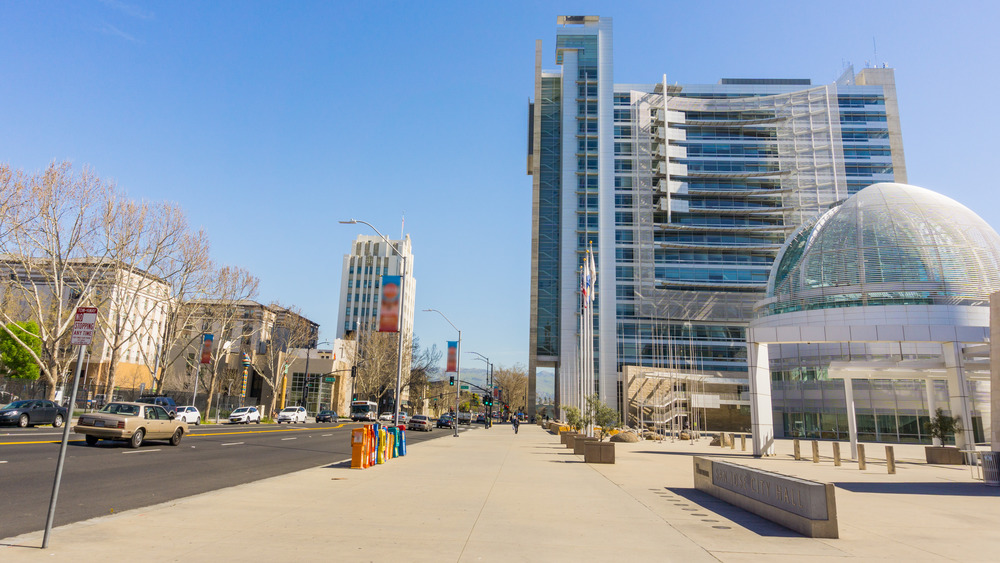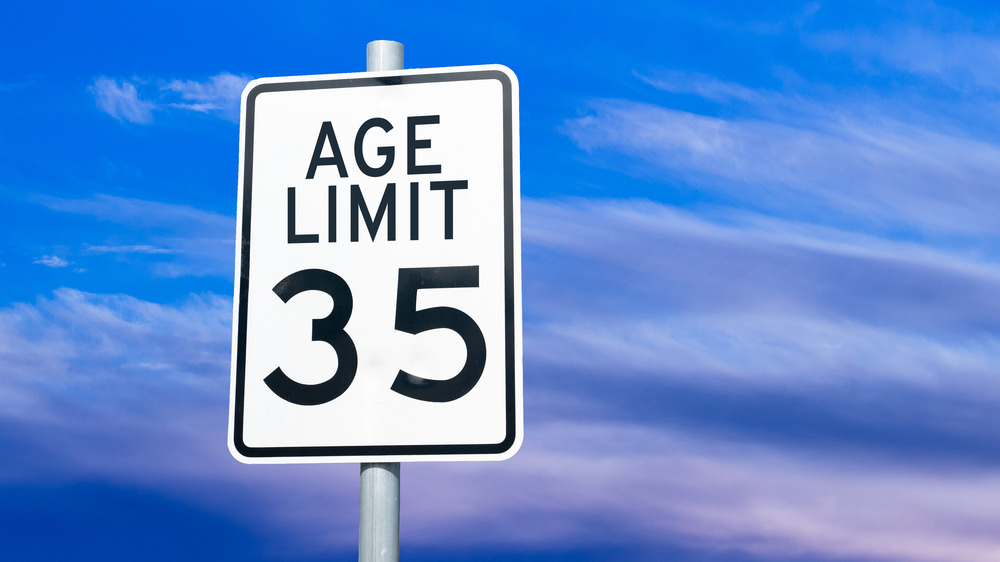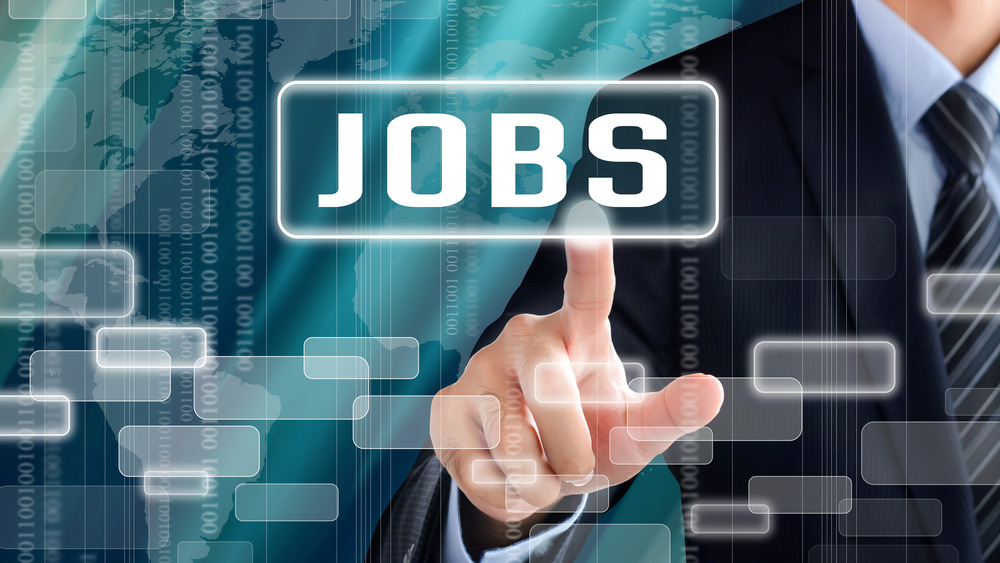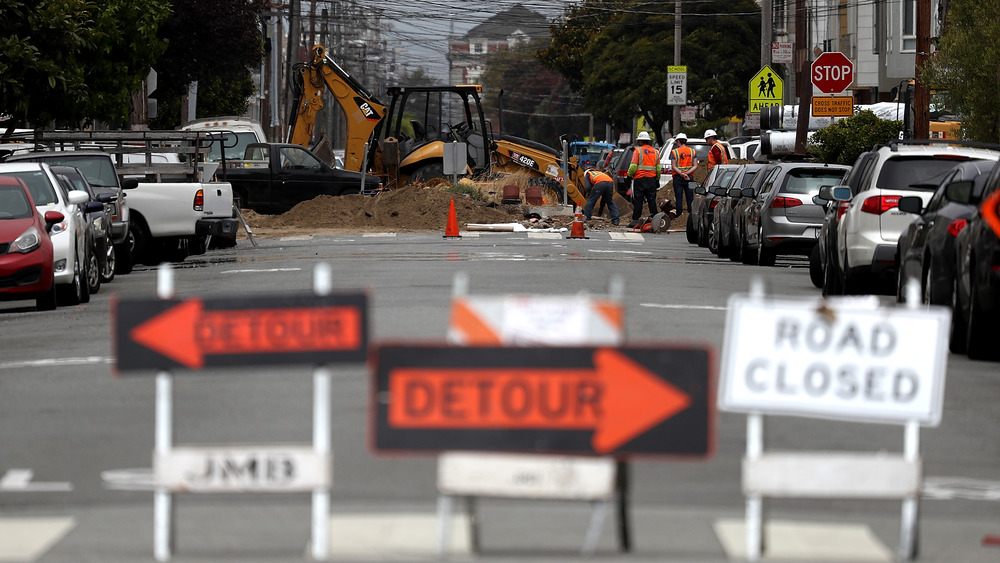The Messed Up Truth About What Goes On In Silicon Valley
Silicon Valley is, for better or worse, responsible for a whole lot of life in the 21st century. From the internet to social media to Amazon delivery to smartphones and electric cars, the guys and gals in Silicon Valley are part of our daily lives in a way that few corporations in history ever have been.
It's funny, then, that we know so little of what goes on there — especially considering how much they know about us.
Silicon Valley may be peddled as the place where dreams come true, where garage inventions become billion-dollar corporate behemoths and college dropouts earn more money than Scrooge McDuck, but the reality of the promised land of technology can be far, far different. The messed up truth about Silicon Valley is that the place is filled with a lot of the same problems the rest of us have, plus quite a few more.
Silicon Valley is unbelievably expensive
If there's one thing everyone knows about Silicon Valley, it's that absurdly rich people live there. One doesn't live amid the creators of the most valuable companies in the history of money and not experience some of that sweet trickle-down. For Pete's sake, the San Francisco Chronicle reported in 2019 that the median annual salary of a Google employee was almost $250,000. Unfortunately for Silicon Valley denizens, however, the area is also cartoonishly expensive, and those high wages go far shorter than one would expect.
As KQED explains, California in general has extremely high housing costs compared to the rest of the country. But, as this Business Insider headline explains, "Silicon Valley's rental market is so absurd, tech workers are living in vans." In a sitcom pitch disguised as a headline, the San Francisco Chronicle gave an even more horrible example: "The Bay Area is so expensive divorced parents can't afford to live separately."
For a variety of reasons that reasonable people (and more than a few unreasonable ones, natch) can and do argue about, Silicon Valley is expensive to live in. According to Payscale, cost of living in the Valley is actually 100 percent more than the national average. It costs so much to live there that, per The New York Times, "the federal government now classifies a family of four earning up to $117,400 as low-income."
Ageism is rampant in Silicon Valley
"Move fast and break things" was the Facebook ethos for a long time. And that is a mantra of the young, the agile, those without pensions: the people building tomorrow — not those already living in it. As Sun Microsystems co-founder and venture capitalist Vinod Khosla said in 2011, per The Washington Post: "People under 35 are the people who make change happen," and "people over 45 basically die in terms of new ideas." If that sounds like a broad generalization based on inherent characteristics, congratulations, you've discovered age discrimination.
Hiring prejudice against those on the grayer side of 35 is not only widespread in Silicon Valley, but there are 28 percent more age discrimination lawsuits brought against Valley employers than even ones based on race, according to Menlo Partners Staffing, a Valley recruiting firm. They recount a survey of tech workers in which 80 percent of employees over the age of 40 are worried about the impact their age will have on their careers. Sixty-eight percent of tech Baby Boomers report being discouraged from applying for jobs because of their age.
Ageism is so prevalent in Silicon Valley culture that many men (the tech world is massively male-dominated) are spending a lot of money on possible workarounds. For instance, there has been a 325-percent increase in men getting cosmetic surgery, "Brotox," in the last five years. As plastic surgeon Dr. Larry Fan said to the San Francisco Chronicle, "They do feel like they are discriminated against."
Misogynistic libertines are in charge
If there is one thing the internet and Hollywood knows, it's that misanthropic men make the best programmers. Lone males, in their basement, shunning human contact in favor of digital desires, are the coders and creators that made our 21st century possible. We're sure you're shocked to learn that everything in that previous sentence was wrong.
Not only were women some of the earliest programmers, but a team of six women programmed ENIAC, the first electronic, general-purpose computer. "Men were interested in building, the hardware," said author Walter Isaacson to NPR, "And women were very good mathematicians back then." According to journalist Emily Chang, in the 60's and '70s, programmers were in such high demand that a company contracted two psychologists to profile who would make the best programmers, and they basically arbitrarily figured that good programmers are anti-social nerds. The percentage of computer sciences degrees awarded to females plummeted from almost 40 percent then to less than 20 percent now.
From this humbly sexist origin, an entire industry has been transformed in its misogynistic likeness. Emily Chang investigated, as she wrote in a 2018 Vanity Fair column, "Inside Silicon Valley's secretive, orgiastic dark side." The dominance of tech bros hasn't merely created a sexist atmosphere making it difficult for women to compete — it has codified the gender imbalance into a not-quite-underground but not-quite-acknowledged party scene fueled by drugs, sex, and double standards. Women are expected to dress up, put out, and shut up.
Working too much is the expectation
Tech companies have stunned the corporate world with their weird and wacky employee perks. Google's Mountain View employees enjoy pool tables, a bowling alley, retro arcade games, volleyball courts, free haircuts, free massages, and free gourmet food. Business Insider actually compiled a list of Google's best slides. Facebook offers everything from ping-pong tables to all-day breakfast, lunch, and dinner. But open spaces, sleeping pods, and yoga studios aren't the benefits — they're the bait.
As Dan Lyons, author of Lab Rats: How Silicon Valley Made Work Miserable for the Rest of Us, summarized to the Wharton School of Business, "Oh, we got tricked. We got distracted by all this fun and kooky stuff over here, and they changed the deal on the back end for us." They tickle your fancy with baubles while hiring you as a contract worker and/or slashing any chance to get promotions, job security in general, or, (surprise, surprise) health care.
Silicon Valley's work culture has embraced an ethic of working more and longer. Why would you need to go anywhere else? You've got everything at work. As the Wharton interviewer said, "Some companies want to have their employees putting in 16-hour days. They put in [...] fun, niche things so that they can have their break in the office and not be that far away from their desk."
There's little job security in Silicon Valley
Some of the highest average wages on the planet and extravagant lifestyle benefits surely make Silicon Valley the place financial dreams are made of. Unfortunately, rather than a modern-day Midas touch, for a whole lot of people working there, Silicon Valley is more the touch of financial death.
The hard truth is that success in the tech world is difficult at best, as 90 percent of startups fail. It's worth remembering that succeeding in business at any level is a struggle and, as reported by Investopedia, only 25 percent of businesses last 15 years or longer. So many CEOs and co-founders have penned public apologies for their company's death that it's become a joke in the industry. "Nine out of 10 startups fail," explained Fortune, "which is why the failure post-mortem has become so common that it's practically a Silicon Valley cliché."
Anyone lucky enough to be working for the companies that survive may actually not be as lucky as you'd think, mainly because they may not technically be working for the company after all. To avoid paying for benefits like sick leave or health care, it's a common practice in Silicon Valley to hire everything from programmers and engineers to janitors and cooks as contractors or through staffing agencies. According to KQED, its is "estimated more than 100,000 white- and blue-collar contractors are working in tech, doing jobs ranging from janitorial work to programming."
Silicon Valley is pretty homogeneous
Given Hollywood depictions of Silicon Valley, one could think that it's populated exclusively by Indian, Chinese, and even-whiter-than-normal white men. All men, of course. Unfortunately, there is both a lot of truth and a lot of lie in that stereotype. In spite of Silicon Valley skewing young and educated, and regardless of political and corporate leaders encouraging diversity efforts, the tech world is pretty lily-white.
CNBC reported the results of a 2018 survey revealing that at some of the Valley's biggest players, like Google, Twitter, and Facebook, fewer than three percent of tech workers are Black. In fact, according to TechRepublic, 83 percent of tech executives are white, over 50 percent of Google and Apple employees are white, and less than half as many Black and Hispanic people work in tech than in the rest of the private economy.
Turns out this isn't exactly a revelation, either to the people who live there or to civil rights leaders. Civil rights icon Jesse Jackson was protesting the lack of diversity in Silicon Valley over 20 years ago. The good news is that not only are tech companies really doing much more to hire underrepresented minorities nowadays, but the industry may finally be aware of the consumer dollars they're missing out on by staying so homogenous. TechRepublic reported that "Diversity efforts could net the IT industry an extra $400 billion in revenue each year." And money is a great motivator.
Discrimination against Indians by Indians
Human beings have no shortage of ways to discriminate against each other. Race, color, religion, nationality, sexuality, whether one is a Yankees fan, and more have all been used as excuses for hatred and bigotry. One of civilization's oldest forms of prejudice actually blends most of those together into a discriminatory system that's been dividing billions of people for at least 3,000 years.
India's caste system, the BBC explains, "divides Hindus into rigid hierarchical groups based on their karma (work) and dharma (the Hindi word for religion, but here it means duty)." The four main castes branched off into tens of thousands of sub-castes, categorized generally by occupation, with a fairly strict pecking order and social order. You can't marry outside of your caste or work or live among higher castes, and you must always defer to a person of a higher caste.
Although illegal in India for decades, the country is still dominated by caste prejudice, and many of the Indians who have migrated to Silicon Valley have apparently brought their caste prejudices with them. The LA Times reported in 2020 that Cisco Systems, specifically two Indian engineers, was being sued by California state regulators on behalf of another Indian engineer. His allegations have been followed by reporting in The Wire that almost 70 percent of lower-caste Indians experience discrimination at work in America.
Silicon Valley is literally a toxic place
Environmentalism is at the heart of much of what happens in Silicon Valley, from Apple's 100-percent clean energy-powered data centers to Tesla's electric everything, tech companies are often at the forefront of cleaner, more efficient, Earth-friendly practices. On the other hand, Silicon Valley literally sits atop a toxic waste dump.
Silicon Valley lies in Santa Clara County, home to more federal superfund sites — areas so polluted that the feds have to come in and clean it up specially — than any other county in the nation. There are 23, according to Quartz. Buried in the ground all over Silicon Valley are the pollutants and chemicals left behind from all of the silicon chips and semiconductors built there during the manufacturing boom from the mid-1960s to mid-1980s.
Google and NASA both have campuses in the Valley that, along with schools, homes, parks, and businesses filled with millions of people, sit above actual toxic waste. Federica Armstrong, a photographer living in Santa Clara County, has been documenting California's superfund sites. "Most people I talked to in the community seemed unaware of their presence," she told The New York Times. "Often, even the notion of Superfund sites is foreign to many people. We are used to taking for granted the safety of the environment we inhabit."
Silicon Valley has shockingly bad infrastructure
Even with a Tesla on every corner, electric scooters on every sidewalk, some of the coolest and greenest office buildings in the world, and an outsized portion of the world's smartest and richest people, Silicon Valley is still hell to navigate. From roads that would fit right in Baghdad circa 2004 to public transportation barely worth the name, Silicon Valley has surprisingly bad infrastructure.
San Jose Inside reported in 2020 that over 60 percent of roads in San Jose are designated "poor" quality by federal regulators. So many roads and walkways need refurbishment, in fact, that, "City officials last year announced a nine-year plan to repave 1,490 miles of residential streets." As if the conditions of the roads weren't bad enough, they are also choked by what, according to the Silicon Valley Business Journal, is the fifth-worst traffic in the country, losing San Francisco residents an average of 78 hours a year.
According to a 2018 San Francisco Chronicle article, "San Francisco has some of the slowest, most prone to break down public transit" when compared to some of the largest metro areas in the country. Buses drive 2 mph slower than average, and the city light rail system goes 5 mph slower. As well as being slow, San Francisco public transit breaks down so frequently that it is "at the bottom of its peer group for most problem-prone transportation."
They aggressively keep secrets
Working in Silicon Valley isn't all ping-pong tables, kombucha bars, and food trucks. Hundreds of billions dollars in investment flow through the Valley, and the products they make there not only disrupt existing industries but can be worth many billions by themselves. The most valuable intellectual property in the world is, as PBS described, an obvious target for spies from places like China, and protecting their corporate secrets really is important. However, many tech companies are using their anti-espionage protocols to spy on, and punish, their own employees.
"You get on their bad side," an anonymous Facebook employee told The Guardian in 2018, "and all of a sudden you are face to face with [Facebook CEO] Mark Zuckerberg's secret police." A different Facebook employee showed The Guardian his signed contract allowing the company "to monitor and record his social media activities, including his personal Facebook account, as well as emails, phone calls and internet use. He also agreed to random personal searches of his belongings including bags, briefcases and car while on company premises." Refusing to agree to these activities would itself be counted as an employee violation.
Unfortunately for tech employees and contractors who want to talk publicly about their working conditions or misconduct within the company, the Stanford Center for Internet and Society told The Guardian, the types of things Facebook is alleged to have done "are common, widespread, intrusive and legal."
Suicide is a major problem in Silicon Valley
Amazing museums, a vibrant art scene, great weather, the best and newest technology in the world, and more money than God attracts young people from all over the world to Silicon Valley. The chance to help build the future, chase their dreams, and become obscenely wealthy lures the best and the brightest, leading to not only unkept promises but also shattered lives.
Silicon Valley has the tragic honor of being one of the planet's suicide capitals. According to the California Management Review, "In the last decade, suicide rates have grown four ti[m]es higher at top tier high schools in Palo Alto than the national average." A toxic combination of status posturing (very popular in the "hyper-alpha image driven tech world"), intense competition, and insanely high-dollar expectations is driving many Silicon Valley residents to suicide, especially, and dreadfully predictably, "after a young individual's business fails."
As if that wasn't bad enough, the Valley is being hit by the same Covid-related spikes in suicides that much of the world is seeing. The national Disaster Distress Helpline reported a 900-percent increase in calls between May 2019 and May of this year, according to the San Jose Spotlight, and the number of people taken to Silicon Valley-area hospitals doubled between February and May this year.
If you or anyone you know is having suicidal thoughts, please call the National Suicide Prevention Lifeline at 1-800-273-TALK (8255).
They're building spy tech for authoritarians
That Facebook, Google, et al know way too much about us is probably well-known by now. Tech executives have been brought before congressional committees multiple times, sort of answering questions about privacy protections and data access. Facebook and the gang spying on us, as USA Today explains, is basically just business as usual by now, so it may not come as the biggest surprise that many of the major tech players are building really intrusive toys for China to create a surveillance state to make Big Brother jealous.
The Intercept revealed in 2019 the extent to which Silicon Valley is working with China to build massive surveillance platforms. The OpenPower Foundation, a nonprofit led by Google and IBM, "is helping China's authoritarian government conduct mass surveillance against its citizens." The systems run or designed by OpenPower enable the Chinese government to spy on, track, and censor the information for a quarter of China's internet users — a whopping 200 million people.
China already does plenty of creepy things to and with people who live there, like assigning them a social credit score, requiring them to get permission to move, or having them submit to facial recognition scans just to buy a new phone. The guys and girls of Silicon Valley really didn't need to out-Orwell them.












